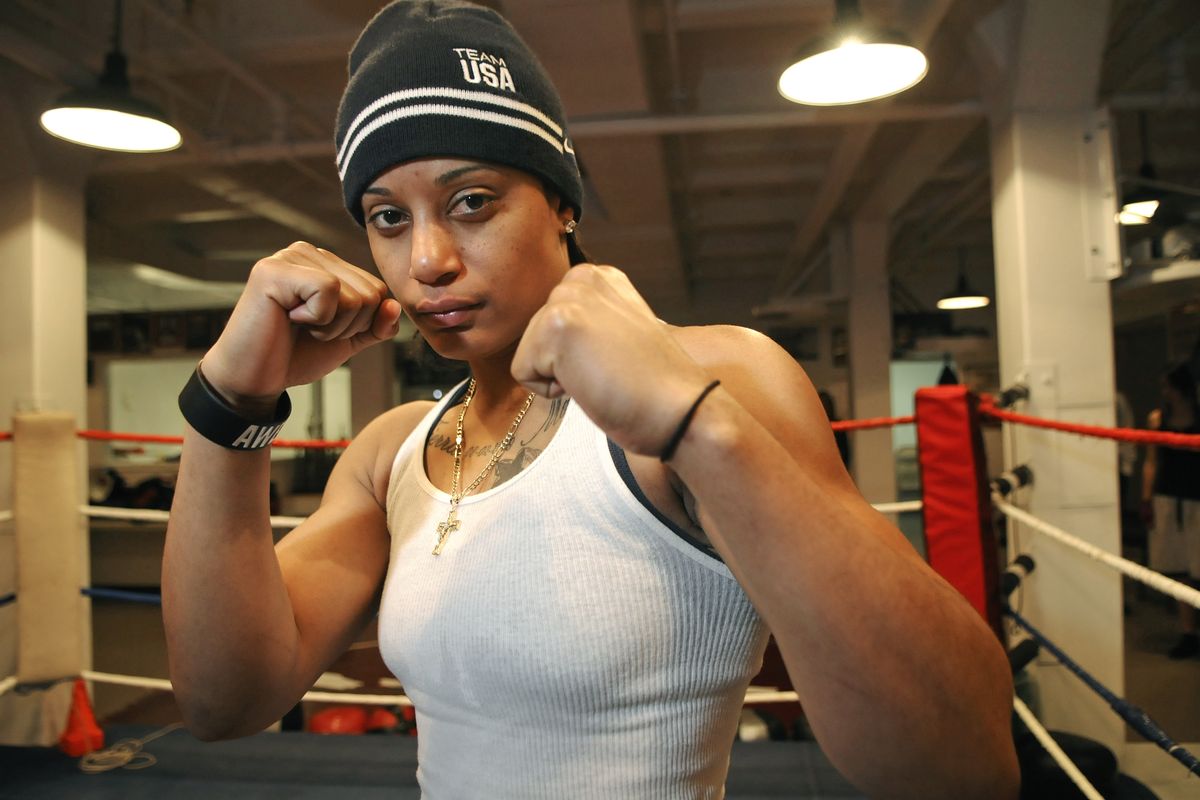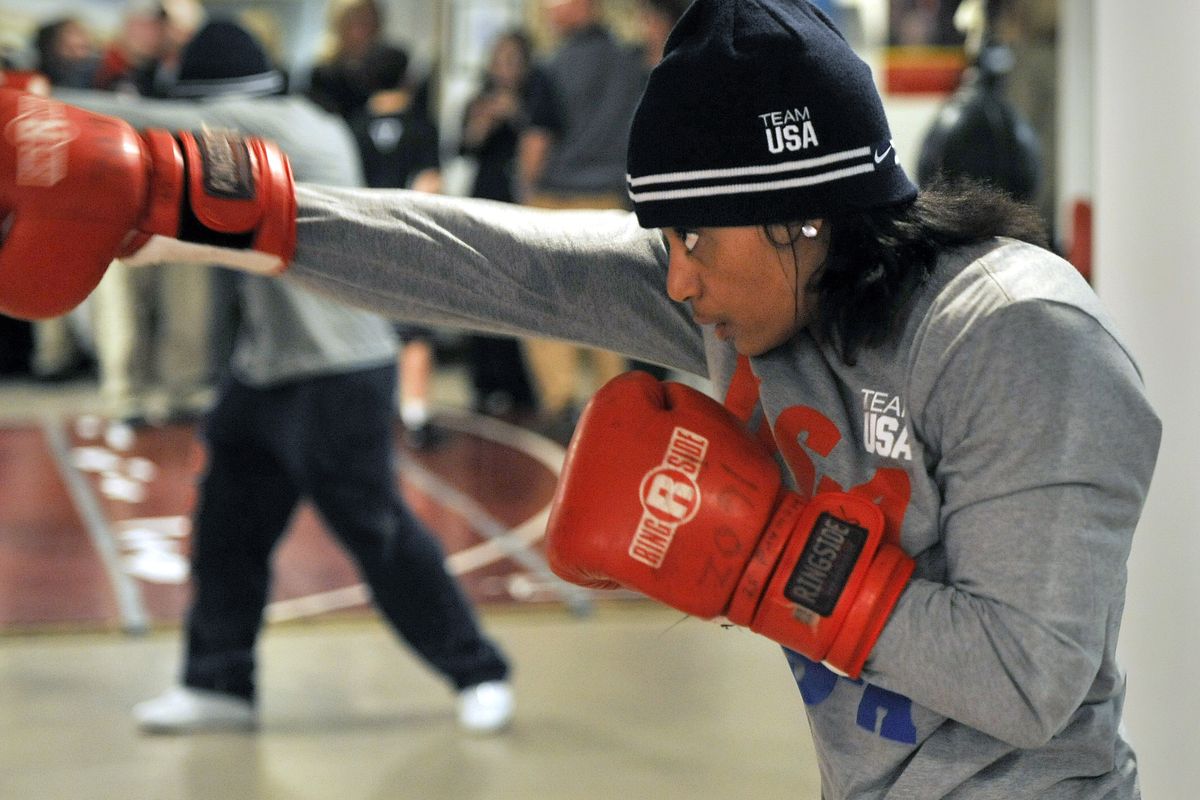Women in spotlight
Seattle’s Underwood battling for Olympic glory
Queen Underwood takes to the ring at Howard Street Gym to prepare for next month’s U.S. Olympic Team Trials at Northern Quest Resort. (Dan Pelle)Buy a print of this photo
Papering the walls of the subterranean Howard Street Boxing Club are the usual posters from bouts and cards going back decades, and they suggest the musty odor of smoke and beer from arenas and armories long razed. Those yellowing bills were the back-in-the-day come-ons for wannabe fighters.
Here’s how much boxing has changed: Converts are now made in beauty shops.
It helps, of course, if a boxer is in the chair.
This happened just on Monday to Queen Underwood, who by virtue of her bronze medal at the last world championships and her Seattle roots is the flag-bearer for next month’s U.S. Olympic Team Trials for Women’s Boxing at Northern Quest Resort. Booked for an awards show later this week, she made an appointment with a stylist.
“I’m tired of braids and ponytails,” she said to the stylist, pinning her hair issues on her current vocation of boxing.
So on Underwood’s return trip to the salon, there to greet her were the woman’s two daughters, armed with cellphone cameras and big smiles and the message, “We want to box.”
“When you get that,” Underwood said, “you kind of know what an important opportunity this is.”
She is talking about the debut of women’s boxing in the Olympic Games this summer. You could call the Spokane trials the first step on that journey, but in fact the first step came 10 years ago.
She was Quanitta Underwood then, a player on the basketball team at Garfield High School and a state-placing sprinter in track. A strength coach had been brought in to help the basketball team with conditioning and so Underwood soon dabbled in power lifting, too. But what she really wanted to do, she told the lifting coach, was box.
“I like the spotlight part of boxing,” she said, “that you’re the one having your hand raised.”
Except that her first time out, it was someone else getting her hand raised.
“I was so nervous,” she said, recalling her introduction to the ring at 19 years old. “I’d never got in a fight outside of boxing. It was all the normal stuff: ‘I’m a lover, not a fighter,’ and ‘I don’t want my teeth knocked out.’ ”
What happened inside the ring, however, wasn’t nearly as bitter as what happened outside it.
“Nobody likes to be a loser,” she said. “Nobody talks to you afterward, or if they do it’s people saying, ‘Oh, I thought you won,’ or ‘You did good’ and you really don’t want to hear that.”
Underwood hasn’t had to hear it all that often since. She went to her first U.S. championships in 2006 and the next year started a run of five straight national titles – the first three as a light welterweight, the last two having dropped down to the 132-pound lightweight division, one of the three being contested for women at the 2012 Games in London.
The big breakthrough came at the 2010 world championships in Barbados, where she won the bronze medal after losing a narrow 18-16 decision to three-time world champ Katie Taylor of Ireland – storming back after falling behind 10-2 after two of the four rounds.
But this past year, Underwood lost two important international bouts – to Great Britain’s Natasha Jones at a test event in London, and to Puerto Rico’s Kiria Tapia in a controversial tiebreaker at the Pan-American Games.
Those came amid the chaos of trying to find a training fit after splitting with her longtime coach in Seattle – a quest that led to a December relocation to the U.S. Olympic Training Center in Colorado Springs, Colo., and an association with former Olympic coach Basheer Abdullah, who had been in her corner in Barbados.
“I needed to find someone I could connect with,” she said, “someone I could trust.”
This has meant some sacrifices, not the least of which is that her 2-year-old bull mastiff King – Queen spots him 3 or 4 pounds, at least – lives with a military family across town. But you only get one chance to be America’s first Olympic female boxing medalist.
It was 2009 when the International Olympic Committee finally caved to the inevitable and added women’s boxing to its offerings. At the time, Underwood was in the middle of a five-year apprentice program as a sprinkler fitter – UA Local 699.
“You’re not supposed to have a cellphone at work, but I was always breaking the rules,” she confessed. “I saw the text and work went out the window. They were like, ‘Get back to work,’ and I said, ‘You don’t understand – I have to go train.’ ”
Actually, she stuck it out to gain her journeyman’s status – and promptly got laid off.
“They do that – I was kind of expecting it,” Underwood said, “and 2011 was a slow year.”
She’s expecting 2012 to be something else altogether.

